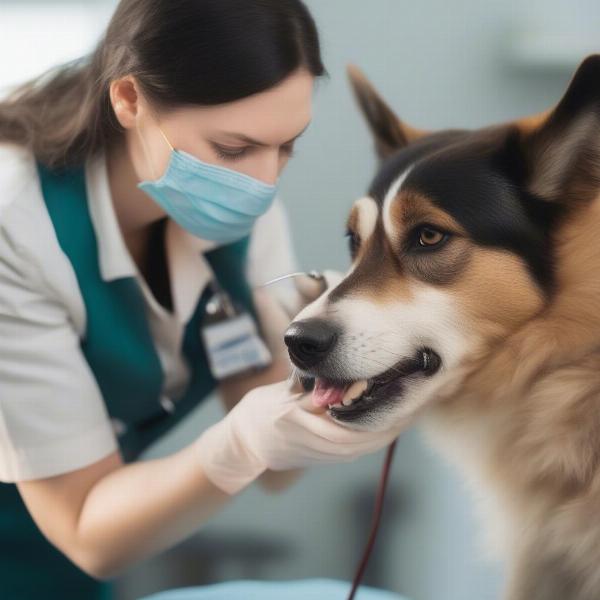Dog dental surgery is a common procedure performed to address various oral health issues in dogs. From routine cleanings to more complex extractions, understanding the reasons behind these procedures, the recovery process, and how to best care for your dog post-surgery is crucial for every dog owner. This guide will delve into all aspects of dog dental surgery, providing you with the knowledge you need to ensure your furry friend’s oral health and overall well-being.
Dental disease is a significant concern for dogs, often leading to pain, infection, and even more serious health problems if left untreated. Regular check-ups and professional cleanings are vital preventative measures, but sometimes, more extensive intervention like surgery becomes necessary. This could be due to anything from broken teeth and abscesses to severe periodontal disease.
Understanding the Need for Dog Dental Surgery
Several factors can contribute to the need for dog dental surgery. Periodontal disease, a common infection of the gums and surrounding tissues, is a leading cause. If left unchecked, it can lead to tooth loss and even damage to internal organs. Fractured teeth, often caused by chewing on hard objects, also frequently require surgical intervention. Abscesses, painful pockets of infection, are another common reason for dental surgery in dogs.
Types of Dog Dental Surgery
There are various types of dental surgeries performed on dogs, ranging from simple extractions to more complex procedures. Extractions are the most common type and involve removing diseased or damaged teeth. Root canals are sometimes necessary to save a severely infected tooth. Other procedures include tumor removal, gum surgery to address periodontal disease, and jaw fracture repair.
Preparing Your Dog for Dental Surgery
Before your dog undergoes dental surgery, your veterinarian will conduct a thorough examination, including blood work and possibly X-rays, to assess their overall health and determine the specific procedure required. You’ll be given pre-operative instructions, such as withholding food and water for a certain period before the surgery.
 Dog Undergoing a Vet Checkup Before Dental Surgery
Dog Undergoing a Vet Checkup Before Dental Surgery
Post-Operative Care and Recovery
After the surgery, your dog will need time to recover. Pain medication and antibiotics will likely be prescribed to manage discomfort and prevent infection. You’ll need to provide your dog with a soft food diet and avoid giving them hard toys or treats until they’ve fully healed. Regular follow-up appointments with your veterinarian will be necessary to monitor the healing process.
homemade dog food after dental surgery
Potential Complications and Risks
While dog dental surgery is generally safe, potential complications can arise, such as infection, bleeding, and delayed healing. In rare cases, nerve damage can occur, affecting the dog’s ability to feel their lips or tongue. Discussing these risks with your veterinarian beforehand is crucial.
Cost of Dog Dental Surgery
The cost of dog dental surgery can vary depending on the complexity of the procedure, the location of the clinic, and other factors. It’s important to get an estimate from your veterinarian before the surgery to avoid any surprises.
best soft food for dogs after dental surgery
Preventing Dental Problems in Dogs
Regular brushing, dental chews, and professional cleanings are essential for preventing dental problems in dogs. A healthy diet and avoiding hard objects that can damage teeth also contribute to good oral hygiene.
How long does dog dental surgery take?
The duration of dog dental surgery varies depending on the procedure, but typically ranges from 30 minutes to several hours.
What are the signs of dental pain in dogs?
Signs of dental pain in dogs include bad breath, excessive drooling, difficulty eating, pawing at the mouth, and changes in behavior.
dog insurance for french bulldog
Conclusion
Dog dental surgery is a crucial aspect of maintaining your canine companion’s overall health. By understanding the reasons behind these procedures, the recovery process, and preventative measures, you can ensure your furry friend enjoys a happy and healthy life, free from dental pain and discomfort. Regular veterinary check-ups and a proactive approach to dental care are key to preventing serious dental issues and the need for extensive surgical intervention.
- What are the common reasons for dog dental surgery? Common reasons include periodontal disease, fractured teeth, and abscesses.
- How can I prepare my dog for dental surgery? Follow your veterinarian’s pre-operative instructions, such as withholding food and water.
- What is the recovery process like after dog dental surgery? Recovery involves pain medication, a soft food diet, and follow-up vet visits.
- What are the potential risks of dog dental surgery? Potential risks include infection, bleeding, and nerve damage.
- How can I prevent dental problems in my dog? Regular brushing, dental chews, and professional cleanings are key preventative measures.
- How much does dog dental surgery typically cost? The cost varies depending on the procedure and clinic, so consult your vet for an estimate.
- What are the signs of dental pain in my dog? Signs include bad breath, excessive drooling, difficulty eating, and pawing at the mouth.
ILM Dog is your trusted resource for comprehensive information on dog care and well-being. We offer expert advice on everything from breed selection and training to health and nutrition. Whether you’re a seasoned dog owner or just starting out, ILM Dog is here to guide you every step of the way. Contact us at [email protected] or +44 20-3965-8624 for expert advice and resources to help you provide the best possible care for your furry companion.